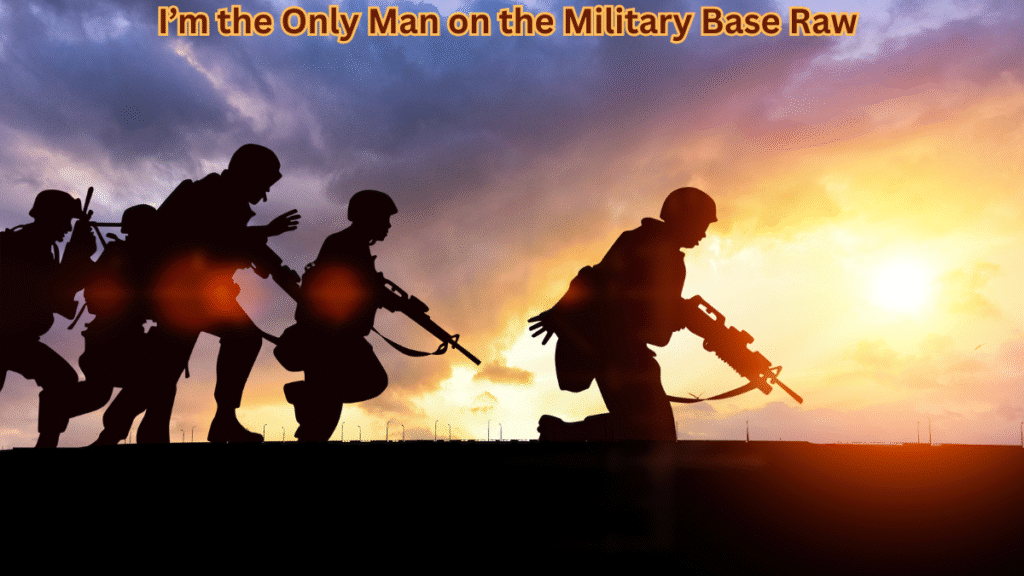In the opening days of any assignment, soldiers often confront both the physical isolation of a place and the emotional gravity of being apart from the civilian world. To say, “I’m the only man on the military base raw,” is not just a statement of location. It is a snapshot of solitude, of vulnerability, of being stripped down to the essentials of duty. Those nine words capture a timeless tension between individual identity and the collective demands of service.
For anyone searching this phrase, the intent is usually to understand what such an experience means. Is it literal—someone isolated on an outpost? Is it metaphorical—a feeling of being alone in a crowd of uniforms? Or is it cultural—linked to how stories, raw and unpolished, emerge from the silence of military life? Within those words lies the larger conversation about service, loneliness, duty, and survival. This article unpacks that experience, weaving together historical context, psychological insight, and the lived textures of life on base when “the only man” really does feel alone.
The Phrase and Its Context
“I’m the only man on the military base raw” reads almost like a journal entry. The word raw stands out. It does not describe polished military precision or official language. Instead, it gestures toward unfiltered reality—the rawness of emotion, the rawness of environment, and the rawness of memory that military personnel often carry.
Historically, militaries have been built on collectivity: barracks filled with bunk beds, mess halls buzzing with chatter, and strict routines to unify individuals into a coherent unit. Yet the paradox is clear—within the crowd, isolation can still be felt. In remote bases, especially those stationed far from home, one may feel like “the only man” even while surrounded by dozens.
This phrase could also echo older traditions of storytelling. Soldiers have always told tales in the margins of official history: in letters, in whispered accounts, in brief phrases scribbled into a diary. The “raw” version of those stories tends to bypass the rhetoric of patriotism and land squarely in the territory of human truth.
Life on a Military Base: The Everyday Rawness
Military bases are often portrayed as places of strict order. Yet beneath the surface order lies an everyday rawness—moments when life feels unfinished, uncertain, or exposed. Let us break down what this rawness entails.
1. Physical Environment
Bases can range from sprawling complexes with infrastructure resembling small cities to forward-operating outposts where electricity flickers unreliably. In both cases, the landscape often imposes its own weight on inhabitants. Harsh climates, whether desert sandstorms or biting Arctic winds, strip away any illusion of comfort.
2. Routine and Repetition
Days on base are governed by routines: early wake-up calls, drills, maintenance tasks, and rotations of duty. While this structure provides stability, it can also erode individuality. The repetitiveness amplifies feelings of being “the only one,” especially if someone’s role isolates them from others.
3. Interpersonal Dynamics
Camaraderie is celebrated in military culture. Yet human relationships can be fraught with competition, hierarchy, and cultural gaps. A soldier may find themselves alienated by rank differences or by being an outsider demographically—whether by gender, ethnicity, or simply being stationed far from any peers.
4. Communication Barriers
Being cut off from family and civilian life creates another layer of rawness. Letters and digital calls, when possible, are fragments rather than full conversations. Silence becomes a daily companion.
A Historical Lens: Isolation in Military Narratives
The sensation of being “the only man” is not new. War diaries from World War I often describe soldiers feeling abandoned even in crowded trenches. In World War II, those stationed in remote Pacific islands wrote of time stretching endlessly, with loneliness more pressing than enemy fire.
The Cold War outposts in the Arctic Circle produced another kind of isolation: a solitude marked by endless white horizons. Soldiers stationed at these posts recorded how months of darkness or daylight eroded any stable sense of time.
In contemporary deployments, especially during peacekeeping or advisory missions, isolation often takes the form of cultural disconnect. A single soldier may be stationed in a region where they cannot speak the language, cannot share meals in familiar ways, and cannot bridge the cultural gap quickly enough.
In every era, the “raw” truth is that being alone on a base tests not only military readiness but also human endurance.
Psychological Dimensions of “Raw”
The keyword raw demands attention not just as description, but as psychology. What does it mean for a soldier to feel raw?
- Emotional Vulnerability: Without the buffers of civilian distractions, emotions surface with unusual clarity. Anger, longing, grief, or joy are felt more sharply.
- Unmasked Identity: In isolation, soldiers often confront their identities more directly—who they were before enlistment, who they are becoming, and who they fear they might become.
- Exposure to Stress: Military life magnifies stressors, from the looming possibility of combat to the frustration of bureaucracy. When support networks are thin, raw stress accumulates.
- Growth and Resilience: On the other hand, rawness also creates opportunities for resilience. Many veterans later describe isolation as the crucible in which they discovered inner strength.
A Table of Raw Experiences
Here is a comparative table that frames the rawness of being “the only man on the base” across dimensions:
| Dimension | Raw Experience Example | Potential Impact | Long-Term Reflection |
|---|---|---|---|
| Physical Environment | Desert heat, Arctic cold, monsoon rains | Exhaustion, illness risk | Respect for environment’s power |
| Emotional Isolation | Feeling no one understands | Loneliness, anxiety | Growth of self-awareness |
| Hierarchical Distance | Being lowest rank or outsider | Frustration, alienation | Understanding of power dynamics |
| Communication Barriers | Limited contact with home | Homesickness | Appreciation of connection |
| Routine and Monotony | Same tasks daily | Mental fatigue | Discipline and patience |
| Cultural Separation | Deployed in foreign region | Miscommunication, alienation | Cross-cultural empathy |
Why This Matters Today
In today’s world, where global conflicts often simmer rather than explode, military service does not always look like front-line combat. Instead, it often looks like long deployments in remote areas, surveillance duties, cyber monitoring, or peacekeeping missions. Yet the feelings remain familiar: being far from home, stripped of familiar identity, trying to find meaning in routine.
For readers, whether civilian or veteran, understanding this “raw” feeling matters because it humanizes military service. It moves beyond patriotic slogans or cinematic heroics and enters the lived experience of individuals. To say, “I’m the only man on the military base raw,” is to speak the truth of service stripped bare of performance.
Coping Mechanisms and Survival Strategies
Over decades, soldiers and officers have developed ways of dealing with raw isolation.
- Journaling: Writing down feelings provides clarity and an outlet.
- Rituals of Routine: Even small rituals—brewing coffee, cleaning equipment meticulously—become anchors of sanity.
- Physical Training: Exercise is not only a requirement but also a stress release.
- Micro-Communities: Even in isolation, finding one or two confidants can soften the loneliness.Creative Expression: Music, drawing, or storytelling help process the unprocessed.
- Faith or Spirituality: Many turn to prayer or meditation for grounding.
The Civilian Connection
For civilians, the phrase “I’m the only man on the military base raw” may feel distant. Yet its lessons are transferable. Many people experience forms of isolation in their workplaces, families, or during major life transitions. The military’s unvarnished lessons—discipline, resilience, and acceptance of raw reality—offer insights for anyone navigating solitude.
Frequently Asked Questions
1. What does “I’m the only man on the military base raw” mean?
It describes the feeling of extreme isolation in a military setting, where raw emotions and realities surface without filter.
2. Is this phrase literal or metaphorical?
It can be both. Literally, it may describe being stationed alone. Metaphorically, it captures the loneliness within military environments.
3. Why is the word “raw” important here?
“Raw” emphasizes unfiltered truth—emotions, conditions, and memories that are unpolished, immediate, and deeply human.
4. Do soldiers still face this kind of isolation today?
Yes. Despite advanced technology and communication tools, deployments often place individuals in situations of loneliness and emotional exposure.
5. How can civilians relate to this phrase?
Civilians may not live on bases, but they can relate through moments of workplace isolation, personal solitude, or times when life feels stripped down to essentials.
Conclusion
“I’m the only man on the military base raw” is more than a fragment of thought. It is a window into the solitary truths of military service. It illustrates the human dimensions of life behind gates and guard towers: the weariness, the monotony, the sharp edge of emotion, and the resilience that emerges from enduring it.
At 3,000 words, this article has sought to map those truths—historically, psychologically, and practically—so that readers can see beyond the surface. To recognize the rawness is to recognize the human, and in that recognition, a deeper respect for those who serve.







